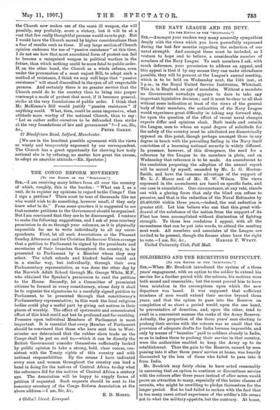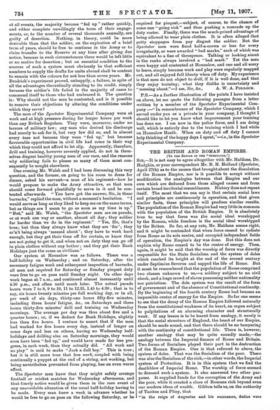SOLDIERING AND THE RECRUITING DIFFICULTY. (To THE EDITOR Or TR.
.SracTsroiLl
SIR,—When Mr. Brodrick introduced the system of a three years' engagement, with an option to the soldier to extend his service for a further period with the colours, his motives were both sound and reasonable ; but the event proved him to have been mistaken in the assumptions upon which the new departure was based. It was supposed that sufficient numbers of men would extend their service beyond three years, and that the option to pass into the Reserve on completion of so short a period would, upon the one hand, be preventative of desertion, and, upon the other, tend to swell in a convenient manner the ranks of the Army Reserve. Actually, the proportion of the three years men electing to prolong their service with the colours was so small that the provision of adequate drafts for India became impossible, and only by means of " bounties " paid to soldiers already in India, so as to induce them to prolong their service in that country, were the authorities enabled to keep the Army up to its establishment. Thus the gain to the Reserve, caused by men passing into it after three years' service at home, was heavily discounted by the loss of those who failed to pass into it from India.
Mr. Brodrick may fairly claim to have acted reasonably in assuming that an option to continue or discontinue service with the colours after three years instead of after seven would prove an attraction to many, especially of the better classes of recruits, who might be unwilling to pledge themselves for the longer period. But he had failed to reckon with the fact that in too many cases actual experience of the soldier's life seems not to whet the military appetite, but the contrary. At home,
at all events, the majority become "fed up " rather quickly, and either complete unwillingly the term of their engage- ments, or, to the number of several thousands annually, are guilty of desertion. Nothing, in theory, could be more desirable than that the soldier, on the expiration of a brief term of years, should be free to continue in the Army or to claim transfer to the Reserve at any time after giving due notice, because in such circumstances there would be left little or no motive for desertion ; but an essential condition to the success of such a system must obviously be that sufficient numbers to supply the drafts for units abroad shall be content to remain with the colours for not less than seven years. Mr. Brodrick's experiment proved, unhappily, a failure, in spite of all the advantages theoretically standing to its credit, simply because the soldier's life failed in the majority of cases to commend itself to those who had embraced it. The question is: Why should not the men be contented, and is it possible to remove their objections by altering the conditions under which they serve ?
The men of the Spectator Experimental Company were at work and at high pressure during far longer hours per week than any British Regulars. They were, moreover, under no terrors of military law ; any man who desired his discharge bad merely to ask for it, but very few did so, and in almost every base not because they were "fed up," but because favourable opportunities in civil life had come in their way which they could not afford to let slip. Apparently, therefore, drill and training, however severely applied, do not in them- selves disgust healthy young men of our race, and the reasons why soldiering fails to please so many of them must con- sequently be sought elsewhere.
One evening Mr. Walsh and I had been discussing this very question, and the former, on going to his room to dress for dinner, asked his servant —a man of his regiment—how he would propose to make the Army attractive, so that men should come forward plentifully to serve in it and be con- tented afterwards. " You have got the answer, Sir, in these barracks," replied the man, without a moment's hesitation. " I would serve as long as they liked to keep me on the same terms, but as things are I mean to go as soon as my time is up." "But," said Mr. Walsh, "the Spectator men are on parade, or at work one way or another, almost all day; they soldier far harder than we do in the regiment." " Yes, Sir, that's true ; but then they always know what they are `for'; they ar'n't being always 'messed about ; they have to work hard enough, but they get their time off for certain, or know they are not going to get it, and when not on duty they can go off in plain clothes without any bother ; and they get their Bank Holidays just the same as civilians."
Our system at Hounslow was as follows. There was a half-holiday on Wednesday ; and on Saturday, after the necessary fatigue work and subsequent inspection of barracks, all men not required for Saturday or Sunday picquet duty were free to go on pass until Sunday night. On other days work began at 7 a.m., and continued almost incessantly until 4.30 p.m., and often until much later. The actual parade hours were 7 to 8, 9 to 10, 11 to 12.35, 1.45 to 4.30 ; that is to say, six hours twenty minutes per full working day, or in all, per week of six days, thirty-one hours fifty-five minutes, including three hours fatigue, &a., on Saturdays and three hours thirty-five minutes' drill and training on Wednesday mornings. The average per day was thus about five and a quarter hours ; or, if we deduct for Bank Holidays, slightly less than five hours. I venture to assert that if the men had worked for five hours every day, instead of longer on some days and less on others, having no Wednesday half- holidays and drilling also on Saturday mornings, they would soon have been "fed up," and would have made far less pro- gress, in each week, than they actually did. "All work and no play" is said to make "Jack a dull boy." This is true ; but it is still more true that less work, coupled with being continually a puppet at the end of a string, not working, but being nevertheless prevented from playing, has an even worse effect.
The Spectator men knew that they might safely arrange football or cricket matches for Wednesday afternoons, and that timely notice would be given them in the rare event of any unavoidable alteration of the usual half-holiday having to be made. Every man knew a week in advance whether he would be free to go on pass on the following Saturday, or be
requited for picquek—subject, of course, to the chance of some one "going sick" and thus pushing a comrade up the duty roster. Finally, there was the much-prized advantage of being allowed to wear plain clothes. It is often alleged that petty stoppages from pay disgust the soldier. But the Spectator men were fined half-a-crown or less for every irregularity, or were awarded " bad marks," each of which was equivalent to a fine of threepence. Talking or looking about in the ranks always involved a "bad mark." Yet the men were happy and contented at Hounslow, and one and all sorry to leave, simply because work and play were regularly mapped out, and all enjoyed full liberty when off duty. My experience is that men do not object to drill, if it is well done, and that they enjoy training; what they dislike is uncertainty and "messing about."—I am, Sir, &e., A. W. A. POLLOCK.
P.S.—As a further illustration of the points I have insisted on above, let me quote the following passages from a letter written by a member of the Spectator Experimental Com- pany :—" In remembrance of the Spectator Company, which I served under you as a private in your company, I thought I should like to let you know what improvement your training has done me. I am now in the police force, and I am doing well, which is entirely due to the training which I had while on Hounslow Heath. When on duty and off duty I cannot help thinking of the happy days I spent,",-4.e., in the Spectator Experimental Company.











































 Previous page
Previous page